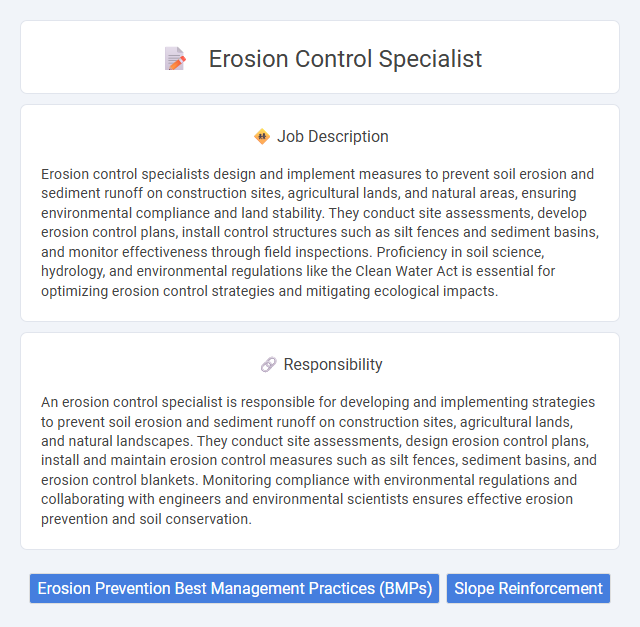
Erosion control specialists design and implement measures to prevent soil erosion and sediment runoff on construction sites, agricultural lands, and natural areas, ensuring environmental compliance and land stability. They conduct site assessments, develop erosion control plans, install control structures such as silt fences and sediment basins, and monitor effectiveness through field inspections. Proficiency in soil science, hydrology, and environmental regulations like the Clean Water Act is essential for optimizing erosion control strategies and mitigating ecological impacts.
Individuals with strong attention to detail and a passion for environmental conservation are likely suitable for an erosion control specialist role. Physical stamina and comfort working outdoors in varying weather conditions may increase the probability of success in this job. Those who prefer sedentary or indoor work environments might find this position less compatible with their preferences.
Qualification
An erosion control specialist requires a strong background in environmental science, civil engineering, or soil science, typically holding a bachelor's degree in one of these fields. Proficiency in soil erosion assessment techniques, knowledge of sediment control methods, and experience with regulatory compliance such as the Clean Water Act are essential qualifications. Certifications like Certified Erosion, Sediment and Stormwater Inspector (CESSWI) enhance credibility and demonstrate expertise in implementing best management practices for erosion prevention.
Responsibility
An erosion control specialist is responsible for developing and implementing strategies to prevent soil erosion and sediment runoff on construction sites, agricultural lands, and natural landscapes. They conduct site assessments, design erosion control plans, install and maintain erosion control measures such as silt fences, sediment basins, and erosion control blankets. Monitoring compliance with environmental regulations and collaborating with engineers and environmental scientists ensures effective erosion prevention and soil conservation.
Benefit
An erosion control specialist likely improves land stability and reduces soil loss, which can prevent costly environmental damage and enhance property value. Their expertise probably supports regulatory compliance, minimizing the risk of fines or project delays. Clients may benefit from sustainable land management practices, promoting long-term ecological health and cost savings on restoration efforts.
Challenge
Erosion control specialists likely face the challenge of balancing effective soil stabilization techniques with environmental regulations and site-specific conditions. They probably encounter unpredictable weather patterns and varying soil compositions that complicate erosion prevention strategies. Managing stakeholder expectations while ensuring long-term sustainability might also present significant difficulties in their role.
Career Advancement
Erosion control specialists apply soil stabilization and water management techniques to prevent environmental degradation, ensuring compliance with regulatory standards like the Clean Water Act. Career advancement opportunities include roles such as project manager, environmental consultant, or regulatory compliance officer, often requiring expanded knowledge in GIS mapping, sediment control technologies, and environmental impact assessments. Gaining certifications like Certified Erosion, Sediment, and Stormwater Inspector (CESSWI) significantly enhances job prospects and leadership potential within construction, agriculture, and land development sectors.
Key Terms
Erosion Prevention Best Management Practices (BMPs)
Erosion control specialists design and implement Erosion Prevention Best Management Practices (BMPs) to minimize soil displacement and sediment runoff in construction and land development projects. They utilize techniques such as silt fences, sediment basins, and vegetative stabilization to protect water quality and comply with environmental regulations. Expertise in analyzing site conditions and selecting appropriate BMPs ensures effective erosion control and sustainable land management.
Slope Reinforcement
Erosion control specialists focus on slope reinforcement techniques to stabilize soil and prevent landslides by using methods such as geotextiles, retaining walls, and vegetation planting. They design and implement erosion control plans that improve slope durability, reduce sediment runoff, and protect watershed health. Expertise in soil mechanics and hydrology is essential to optimize slope stability in construction and environmental restoration projects.
 kuljobs.com
kuljobs.com